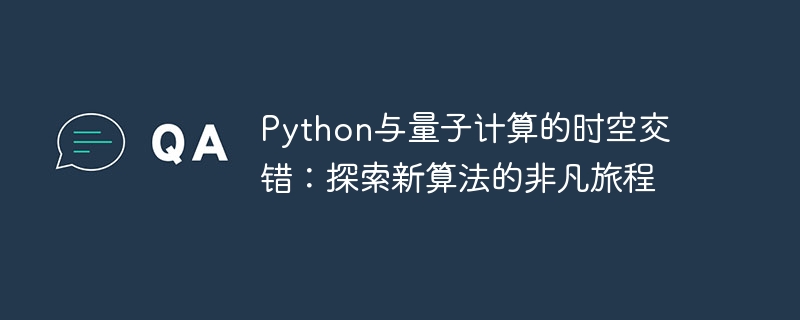
#pythonAs a generalprogramming language, with its concise syntax, rich libraries and strong community support, it has become ## One of the preferred languages in #artificial intelligenceand data science. With the rapid development of quantum computing,Pythonhas also been introduced into this exciting field and plays a vital role.
Application of Python in Quantum Computing
1. Quantum
AlgorithmDevelopment
Python provides strong support for the development and implementation of quantum algorithms. Quantum algorithms are algorithms that run on quantum computers and have attracted much attention for their ability to solve certain problems that are difficult for classical algorithms to solve. Python can help quantum algorithm developers quickly build quantum circuits,
testand verify the correctness of the algorithm, and analyze andvisualizethe results of quantum calculations.
For example, the following Python code demonstrates how to use the Cirq library to build a simple quantum algorithm:
import cirq # 定义量子比特 q0 = cirq.LineQubit(0) # 创建Hadamard门 h = cirq.H(q0) # 创建测量门 m = cirq.measure(q0) # 创建量子电路 circuit = cirq.Circuit([h, m]) # 模拟量子电路 simulator = cirq.DensityMatrixSimulator() result = simulator.run(circuit, repetitions=1000) # 打印测量结果 print(result.measurements["m"])
Copy after login
2. Quantum simulation
Python can also be used for quantum simulation, which is the use of classical computers to simulate quantum systems. Quantum simulation is an important tool for studying quantum phenomena and developing quantum algorithms. Python can help quantum simulation researchers build models of quantum systems, simulate the behavior of quantum systems under different conditions, and analyze simulation results.
For example, the following Python code demonstrates how to use the QuTip library to simulate a simple quantum system:
import qutip # 定义量子态 psi0 = qutip.basis(2, 0) # 定义哈密顿量 H = qutip.sigmax() # 定义时间演化算符 U = qutip.expm(-1j * H * t) # 演化量子态 psi = U * psi0 # 计算量子态的期望值 expectation_value = psi.expect(H) # 打印期望值 print(expectation_value)
Copy after login
3. Quantum
Machine Learning
Python also plays an important role in the field of quantum machinelearning
. Quantum machine learning uses qubits and quantum gates to build machine learning models, which can solve some problems that are difficult to solve with classical machine learning models. Python can help quantum machine learning researchers build quantum machine learning models, train and evaluate model performance, and analyze model results.
For example, the following Python code demonstrates how to use the PennyLane library to build a simple quantum machine learning model:
import pennylane as pl # 定义设备 dev = pl.device("default.qubit", wires=2) # 定义量子电路 @pl.qml.qnode(dev) def circuit(x): pl.RX(x[0], wires=0) pl.RY(x[1], wires=1) return pl.expval(pl.PauliZ(0) @ pl.PauliZ(1)) # 定义损失函数 def loss(x, y): return (circuit(x) - y) ** 2 # 定义优化器 optimizer = pl.AdamOptimizer(0.1) # 训练模型 for i in range(100): x, y = ..., ...# 训练数据 optimizer.step(lambda x: loss(x, y)) # 评估模型 x_test, y_test = ..., ...# 测试数据 accuracy = pl.accuracy(circuit, x_test, y_test) # 打印精度 print(accuracy)
Copy after login
Python Quantum Computing Library
Currently, Python already has many excellent quantum computing libraries, providing powerful tools and resources for the research and application of quantum computing. These libraries include:
Cirq: A library for building and simulating quantum circuits.
QuTip: A library for simulating quantum systems.
PennyLane: A library for building and training quantum machine learning models.
Qiskit: A comprehensive quantum computing library including functions for quantum circuit construction, simulation, optimization and visualization.
- Conclusion
The intertwining of time and space between Python and quantum computing brings infinite possibilities to the discovery and development of new algorithms. Python has demonstrated strong capabilities in the fields of quantum algorithm development, quantum simulation, and quantum machine learning, and has become an essential tool for quantum computing research and applications. With the continuous improvement and development of the Python quantum computing library, I believe Python will continue to play a more important role in the field of quantum computing.
The above is the detailed content of The intersection of time and space between Python and quantum computing: an extraordinary journey to explore new algorithms. For more information, please follow other related articles on the PHP Chinese website!






